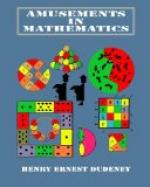“Oh, very well, then, father. Here is another. The Post-Office people were about to erect a line of telegraph-posts over a high hill from Turmitville to Wurzleton; but as it was found that a railway company was making a deep level cutting in the same direction, they arranged to put up the posts beside the line. Now, the posts were to be a hundred yards apart, the length of the road over the hill being five miles, and the length of the level cutting only four and a half miles. How many posts did they save by erecting them on the level?”
“That is a very simple matter of calculation,” said Mr. Filkins. “Find how many times one hundred yards will go in five miles, and how many times in four and a half miles. Then deduct one from the other, and you have the number of posts saved by the shorter route.”
“Quite right,” confirmed Mr. Allgood. “Nothing could be easier.”
“That is just what the Post-Office people said,” replied George, “but it is quite wrong. If you look at this sketch that I have just made, you will see that there is no difference whatever. If the posts are a hundred yards apart, just the same number will be required on the level as over the surface of the hill.”
[Illustration]
“Surely you must be wrong, George,” said Mrs. Allgood, “for if the posts are a hundred yards apart and it is half a mile farther over the hill, you have to put up posts on that extra half-mile.”
“Look at the diagram, mother. You will see that the distance from post to post is not the distance from base to base measured along the ground. I am just the same distance from you if I stand on this spot on the carpet or stand immediately above it on the chair.”
But Mrs. Allgood was not convinced.
Mr. Smoothly, the curate, at the end of the table, said at this point that he had a little question to ask.
“Suppose the earth were a perfect sphere with a smooth surface, and a girdle of steel were placed round the Equator so that it touched at every point.”
“‘I’ll put a girdle round about the earth in forty minutes,’” muttered George, quoting the words of Puck in A Midsummer Night’s Dream.
“Now, if six yards were added to the length of the girdle, what would then be the distance between the girdle and the earth, supposing that distance to be equal all round?”
“In such a great length,” said Mr. Allgood, “I do not suppose the distance would be worth mentioning.”
“What do you say, George?” asked Mr. Smoothly.
“Well, without calculating I should imagine it would be a very minute fraction of an inch.”
Reginald and Mr. Filkins were of the same opinion.
“I think it will surprise you all,” said the curate, “to learn that those extra six yards would make the distance from the earth all round the girdle very nearly a yard!”
“Very nearly a yard!” everybody exclaimed, with astonishment; but Mr. Smoothly was quite correct. The increase is independent of the original length of the girdle, which may be round the earth or round an orange; in any case the additional six yards will give a distance of nearly a yard all round. This is apt to surprise the non-mathematical mind.




